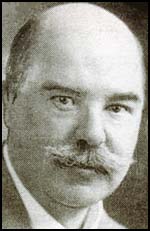Tutbury boy saves Manchester United from extinction
Look on one of the many Manchester United websites and you’ll read: “Without him, the club would have likely gone under, we wouldn’t play in red, and we wouldn’t play at Old Trafford.”
Manchester United began life in 1878 as Newton Heath LYR, formed by employees of the Lancashire & Yorkshire Railway’s Carriage and Wagon Works. The team wore Green and Gold jerseys, the colour of their employers, and played their home games on a pitch at North Road in Manchester. They soon flourished in local Manchester competitions. Their initial application to participate in the newly formed Football League in 1888 was turned down and they subsequently competed in regional leagues. One of these, the Alliance, merged with the Football League in 1892 creating two divisions; Newton Heath participated in the first tier of English football that season. They finished bottom and gained the distinction of becoming the first team to be relegated to the Second Division. (Remember to let that slip into the conversation the next time your MU supporting friends are getting a little cocky).
The club continued to play in the Second Division and soon faced financial difficulties, with falling ticket sales and rising debts. In 1901 the club decided to organize a marathon fund-raising bazaar to avoid being wound up. According to folklore (there are several variants of the story) the captain, Harry Stafford, had a St. Bernard dog called Major who would roam about with a tin around his neck to collect money. Major strayed from his owner and was kept for safety at a pub owned by a brewery of which wealthy John Henry Davies was Chairman. John took the dog to his home at Great Warford, Alderley where his eleven year old daughter Elsie fell in love with it. Harry Stafford searched for his lost dog and found it with Davies. Davies offered to buy the dog for his daughter but Stafford refused. However the two got talking and Davies agreed to rescue the football club in exchange for the dog.
And so in March 1902 Davies, at the head of a group of other local businessmen, invested in the club, wiped out its debts of £2,670, and saved it from almost certain extinction. Davies became the Chairman. Under his stewardship the club’s name was changed to Manchester United FC to widen its appeal. They changed their colours to red shirts and white shorts. By 1907 they were back in the First Division, winning the League in 1908 and the FA Cup in 1909. In 1910 Davies funded the move to a new ground at Old Trafford. Davies served the club as Chairman until his death in 1927.
The brewery magnate left an estate valued at £515,000 (equivalent to many millions today). But how did a poor boy from Tutbury find his way to fame and fortune? In truth, the Tutbury connection was somewhat temporary. His father, David Davies, was originally from North Wales, but moved to Manchester and in 1853 married the daughter of a Farmer who in the depression after the repeal of the Corn Laws had come to Manchester as a Labourer. Between then and 1878 they had ten children, all born in Manchester with the exception of John and a younger brother, both born in Tutbury in the mid 1860’s.
So what were they doing in Tutbury? Almost certainly following David’s work opportunities. He was variously described on Censuses and baptism records as an Engine Feeder, Engine Driver and Warehouse Engineer – i.e. an operator (driver and/or fireman) of steam engines (static and/or railway). It’s possible he was working at the Tutbury Cotton Mill or the Tutbury Glassworks which both had static engines, or perhaps at one of the Burton breweries, which were in their early heyday, recruiting from all over the country, and no doubt using lots of static steam power as well as running extensive networks of internal private railways.
The family were back in Manchester by 1871, but the secret behind young John’s subsequent rise to business eminence is not immediately obvious from the records. In 1881 he was a Cashier, and by the time of his marriage in 1888 he’d progressed to Accountant. In 1891 he was a Commission Agent and had added Henry to his name. His marriage was to Amy Cattrall, a “niece and ward” of Sir Henry Tate, the self-made sugar magnate. But reportedly Tate did not approve of the relationship and the catalyst for John Henry’s success must have come from his own enterprise. He became involved in property development, including investing in the new processes for steam extraction of the Cheshire salt deposits. From the late 1890’s and over the next two decades he built up interests in a large number of Manchester breweries through takeovers and amalgamations, that put him in a position to lead Manchester United through a quarter century of growth and success.

Thanks to Kieran Smith for bringing this connection to the Museum’s attention, and to Ian Bowers, great-nephew of John Davies, for further information.)